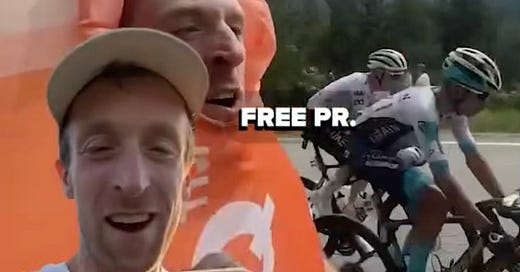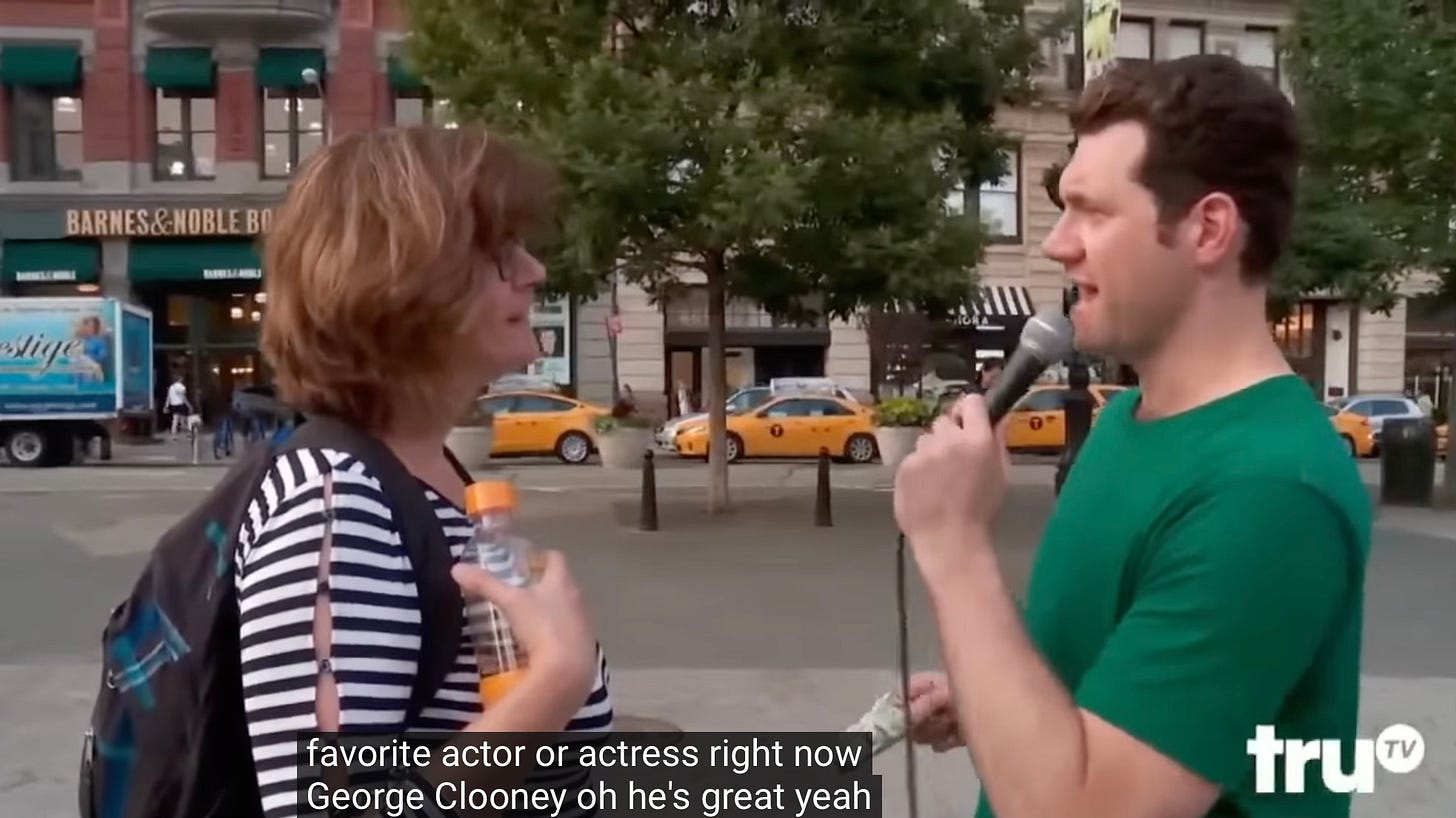Ah … the vox pop interview, the “man-on-the-street” take, the chagrin of my early journalism career. The trickle of sweat that begins on your spine as you survey a crush of people walking by deciding who looks friendly, holding your reporter’s notebook like a clutch, imagining it gives you magical credibility.
I’d ask about everything my editors wanted me to: in New York it was the Million Youth March, in Berlin, what people though about the American election, in Miami, whether anyone had seen the suspect before he was arrested outside of his home. There were scores more but I’ve suppressed them all.
Flash forward however many years and it’s hard not to feel a bit of PTSD watching the dozens of bold and beautiful TikTok and IG personalities fearlessly conducting street interviews holding those dumb mini-mics with an iPhone camera rolling. I’m not talking about the genius of Billy Eichner’s “Billy on the street” work, which does a fine job of mocking the construct.
But how about all those social media employees out there asking people about soda flavors, or fragrance preference, or what they’d save from their burning house? Where did this all this fearlessness come from? This ease with exhibitionism?
Brands love to deploy these tactics in their social content. It’s an opportunity to have a quick-witted, charming “host” positioning you to a new, unaware audience. Best case, there’s a bit of consumer research going on, worst case you get some good reactions for your channels.
It’s also a way to educate. And there’s a particular strain of product this serves well: nootropics, a catch-all term for brain and cognitive stimulating powders, or drinks or gels. Owing to the growing numbers of us who believe in body and mind optimization, Nootropics are currently a $10 billion market and predicted for compound annual growth in the coming years.
This explains the popularity and traction of new companies in the space. In decades past, they would have been advertised on late-night commercials, or the QVC network. These days, they’re jockeying for a mention on Joe Rogan, offering colorful point of sale shelf displays, and working the socials hard.
But what they’re tapping into is a bigger issue: a remedy for our overall mental fatigue, our perceived lack of creativity, endurance, and focus. For this, they charge a good amount of money, encouraging subscriptions to bring down the cost. The message is “be a better you”, but the way there is explanatory, educational and, well, unimaginative. Let’s take a look at some exceptions.
Ketone-IQ ☕️ started life as a coffee sugar cube of sorts on Shark Tank years ago and let’s pause quickly to pour one out for Geoffrey Wu and Michael Brandt on that one because they got absolutely slammed by the Sharks™️. Undeterred, the founders kept at it, testing different products in the marketplace before arriving at a winner that focuses on improving our metabolic health. We’re speaking, of course, about the honorable ketone, an acid our livers produce from fat when there’s not enough glucose in our system. Their pitch is that ketones offer a “more efficient fuel that can produce more power while using less oxygen.” The goal, as Brandt put it recently on the worthwhile “Second Nature” podcast is to make ketones loom as prominently in our collective awareness as electrolytes. That’s a wonderful goal, even if their narrative — our product provides a radical boost in focus and endurance — is narrow. The method there trods some typically cost-efficient, audio-heavy paths: podcast interviews with their founders, sponsorship of a successful Lance Armstrong-hosted cycling podcast, and hosting their own, hyper-scientific podcast on health. But they have a bit of a secret weapon in Brandt, an otherwise hum-drum entrepreneur who got so into endurance sports while testing these supplements that he became a 2:40 marathoner. It’s through Brandt that Ketone manages to both educate, and ingratiate itself into the scenes — cycling, swimming, running — that the company sees as both their core customer base and source of influencers. This often relies on Brandt’s confident, goofy personality. He recently donned a Ketone bottle costume and sprinted along a tough climb on the Tour de France as the cyclists zipped by. To celebrate Ketone’s launch in the Sprouts grocery chain, he ran a marathon between all of the Sprouts locations in LA. These marketing stunts serve awareness, but fail to tie into a larger narrative around the brand. How does the preferred product of Tour de France cyclists expand beyond the high performance athlete or “optimizer” space? Look at this psychedelic, Ayahuasca journey of a Gatorade ad from 1970. Now look at its successor, from 2 months ago. The difference? One talks about what it does for you, the other, all the things you can do with it.
Thesis 📋 requires you to take a test upon first entering their web site. You answer questions around how much you sleep, exercise, and then it gets deeper: do you feel anxiety in social situations? Do you worry about the future? Feel regret about the past? The solution? A personalized set of nootropics, beautifully packaged in bold colors and sans serifs, with clear, helpful terms like “Logic”, “Creativity”, etc. It reminds me of the best cannabis branding. Don’t describe the feeling, but what that feeling inspires. Similar to weed, their desired demographic is all over the place. Their product is aimed at anyone struggling with focus, creativity, and confidence. How do you tell a specific story around that? Rather than define a group of people who would benefit, they deploy use cases — spring cleaning for hoarders, studying for accounting exams, etc. — inspired by testimonials of the people writing in. These are important to verify the efficacy of the product. Nootropics also seems to benefit from an unusually engaged customer base: experimenters desperate for some sort of remedy to their cognitive imbalances. Thesis responds with expert medical advice, offering coaching with a network of nutritionists and naturpaths. Their endorsements come from CEO doctors (which I guess is a thing), an ex NBA all-star, and Rich Roll. That last one probably does the most for them, given his overall self-optimization vibe. But it’s hard to convince people unless they try it themselves. And this is where they might better define the situations where we find it hardest to perform, even though the environment demands it. For inspiration, they can go to athletes or artists. But they also needn’t look too far. Their founder, Dan Freed, dropped out of high school to work at a Subway because of crippling ADHD. He then traveled the world as a corporate chef before tackling his motivation and concentration issues with nootropics. The result? Graduate school at Yale and the founding of a company — the kind of high-stakes situation that is both aspirational and relatable.







I think I have been pitched by every random nootropic company under the sun at this point. The pitches hit my inbox like clockwork. In a similar workmanlike vein I delete them. Occasionally I'll write back and ask questions like "Do you have any research about how nootropics interact with SSRIS? Or research about which parts of the brain and nervous system this product affects? What is the mechanism?" Needless to say...they never do.